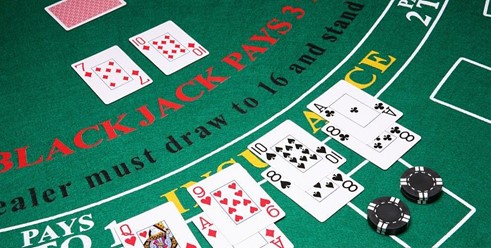When to hit or stand in blackjack
Blackjack is one of the most well-known and popular casino games in the world. From celebrities to the average layperson, the game has fans of all ages and from all different backgrounds. If you want to try your hand at the game but aren’t sure where to start, you’ve come to the right place. We know everything there is to know about blackjack, and we’re ready to help you master the game. Blackjack: hit or stand?
Blackjack has a few different rules and strategies to consider as you play. This article will take a close look at the tips and tricks surrounding hitting and standing like a pro.
When to hit in blackjack
Understanding the blackjack hit process is a critical element of successful gameplay. Doing this well can help lower the house edge and streamline your play. If your goal is to play with the best odds possible, mastering this process should be your first step. So, let’s dive in!
If you have a hand with a total value of eight, you should hit. There is no way to go bust on a single hit in this situation, and the opportunity to make a strong hand for yourself with all of the 10-value cards is strong.
Don’t only look at your own cards when deciding to hit or stand. If the dealer has a high-value card facing up, they are likely to get close to 21. And while the overall goal of blackjack is to make 21, the immediate goal is to beat the dealer.
There are a few other tips to keep in mind. If the dealer has an ace and you have an 11, hit. If the dealer’s face-up card is 10 or an ace and your hand is a value of 10, hit. If you have a nine and the dealer has a two or seven-through ace, hit. Finally, always hit on five, six, seven and eight.
Stand in blackjack
Making smart and successful hits is only one part of the equation. The other step is understanding a blackjack stand. Players often struggle with their decision to stand and often stand too early or make risky hits as a result. Here are some tips to understand when making your choice.
First, let’s talk about soft and hard hands. When you don’t have an ace, you have a “hard” hand. This means that the hand is not malleable and cannot be changed around as the need arises.
“Soft” hands – hands that contain an ace – can be altered slightly. If you land a 10, for example, the ace would be worth 11 and get you to blackjack. If you hit a few times and eventually receive a card that would take you over 21 if the ace value was 11, you can count its value as one, instead.
Let’s say your hand total is a hard 16, and the dealer shows a six or lower-value card; stand. If they show a two, hit. You can also double down on cards three through six if you have a soft hand as well as if you have a hard hand with a two, three, four or five.
If you have a hand of 17 or higher, you should stand because you are likely to go bust with the next hit. Hands such as pairs of 10s or pairs of 9s can sometimes be split into new hands. Stand if your hand totals 13 or 16 and the dealer has a two through six showing. Finally, stand if the dealer has four, five or six and you have a 12.
These are not the only tips to help make your decision easier, but they are some of the most effective, tried-and-true of them.
When to split
Many players have the question “Blackjack: hit or stand?” but fewer of them are focused on splitting their hands and what that means. Splitting can be a great way to play your hand, but only if you understand when to do it and when not to do it.
When you receive a hand with two of the same card in it, you can split your hand and start a new one with the card from your original hand. If you have a pair of nines, for example, you can split the hand and start a new hand with a nine as the beginning card. This leaves your original hand with one nine.
Splitting your cards can be a good choice in a few different situations, and a bad choice on others. First, do not split on 10s. You already have a 20-value hand and are unlikely to do better than that with your other hand. Splitting aces is a good choice because your chances of reaching 21 are higher with two 11-value cards instead of two one-value cards. Splitting on eights is also a good choice, but splitting lower than that offers diminishing returns.
When to double down
Doubling down means that you double your bet for one last hit. If it sounds risky, that’s because it is. When done properly, however, it can increase the amount of money you take home.
Here are a few examples of when you should double down:
- When your cards total 11
- When you have a hard nine or 10
- When you have a soft 16, 17 or 18
Avoid doubling down when the dealer has an ace or you have a hard hand higher than 11.
When to surrender
Surrendering in blackjack can be a good strategic move, but only if it makes sense strategically. There is one hard-and-fast rule to keep in mind: if your hand is less than 50% likely to win against the dealer, consider surrendering. Other surrender tips are highly dependent upon the strategy you play with, but this one is almost universal.
Does blackjack take skill?
Yes, blackjack absolutely takes skill. It is possible to have fun without it, but if you are serious about winning, you need to understand what you’re doing and why. The good news is that blackjack skills can be acquired with practice and hard work, so don’t worry if you’re new to the game. Keep on playing and doing your homework, and you might find yourself with better hands soon.
FAQs
When does the dealer have to hit in blackjack?
Traditionally, dealers can stand at a hand value of 17 or higher and must hit at 16 and under. Some casinos also require dealers to hit on a soft 17, too.
Do you hit on 16 blackjack?
Hitting a hard 16 is tempting. The hand is just low enough to make winning against the dealer’s hand unlikely but high enough that going bust upon a hit is a real possibility.
Here is the fact: if you hit a 16, you have a roughly 25% chance of winning, a 5% chance of push and a 70% chance of busting. If you stand on a 16, you have a roughly 29% chance of winning, a 1% of push and 70% chance of busting. You’re more likely to win with a stand.
Are you ready to play some blackjack? From hitting and standing to splitting and doubling, we have some of the best tips you need to know. Follow our tips above and use them as a springboard to fuel your own research!
Comments
Comments are closed.





Pingback: Blackjack vs Spanish 21 | Comparison